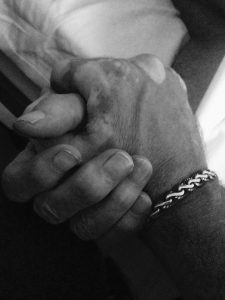
*warning – this is a raw and detailed post about palliative care . Please consider before reading. This is not normally a topic that is made public however I am doing so in ‘real time’ to allow people to feel what we feel to hopefully prepare or help others.
Hi Everyone,
Just wanted to update you on where we are at with Bob. We have continued to be by his side as we are now almost through our 3rd nite. We have camped within his room and just watched and waited.
A lot has changed in the last 24 hours with him both physically and with his breathing. We have endured a power blackout where the care staff had to race around and unplug all the air beds in many rooms to ensure they did not deflate. Mum and I had to attend to a female resident during the. blackout as she was disturbing another very frail lady who was asleep in her bed. We had to toilet the lady, calm each of them down and return her to her room in the dark.
Bob has been really labouring and it is so painful to watch. We feel so helpless as all we can do is rub his head, hold his hand, talk to him or maybe wipe him down with a flannel. Listening to breathing patterns is so hard to do. Bob has a pacemaker, which we can almost feel re-igniting his heart after long extended pauses. The pacemaker is extending the ‘end of life’ process and making this more difficult. This has taken away the ability for Dad to pass away on his terms.
Pain medication is constantly monitored via a Niki Pump ( syringe driver) which is a lockable battery operated pain management device that is attached to the person and stored in a pouch. The device administers medications such as Morphine, Midazolam. Maxalon and Buscopan in a constant and measured fashion.
You become very educated very quickly in palliative care and it is amazing to watch the completely different roles required of the care staff and nursing staff. It makes changing a wet bed or a pad almost insignificant when compared to what is required both emotionally and physically during the final palliative stage.
Care staff have to re-position Bob every 2 hours and this is really taxing on him. Our aim is to give him maximum comfort and we position pillows for best pain management.
The care staff are visibly affected as they have become very attached to Bob, and many mention his trademark smile. One nurse tells us of how she enjoys looking after him and kisses him on the forehead each time she has checked on him.
Bob’s Dignity and wellbeing is the overwhelming concern we have at this time. We have had a myriad of emotions over the last 3 days and we have switched from hanging on to him, to silently pleading for him to be able to ‘go’ in peace. We have tried everything within our power to allow him to pass, without success. We are tired, frustrated, stressed and sad all at the same time. We are braced for anything and you need every ounce of strength and willpower to deal with this at such close range. Dad deserves our love and loyalty and we are hanging in there for him no matter what.
This is a hard post to write and really raw, but I need to highlight how challenging and testing this time is for our family. It would have been nice for Dad to just peacefully slip away as often happens with others, but his entire dementia journey has been one of extremes, and once again he is experiencing the most difficult of conditions. Our family position has never been about ‘what is best for us’ but moreso ‘ what is best for Dad’. This is still the case and we are unwavering, but Dad needs to be free from his pain.
We wait and hope…




 Facebook
Facebook Twitter
Twitter LinkedIn
LinkedIn